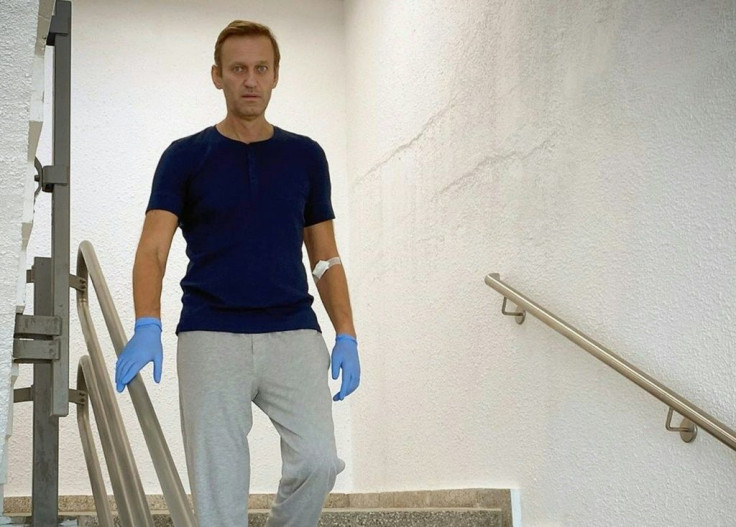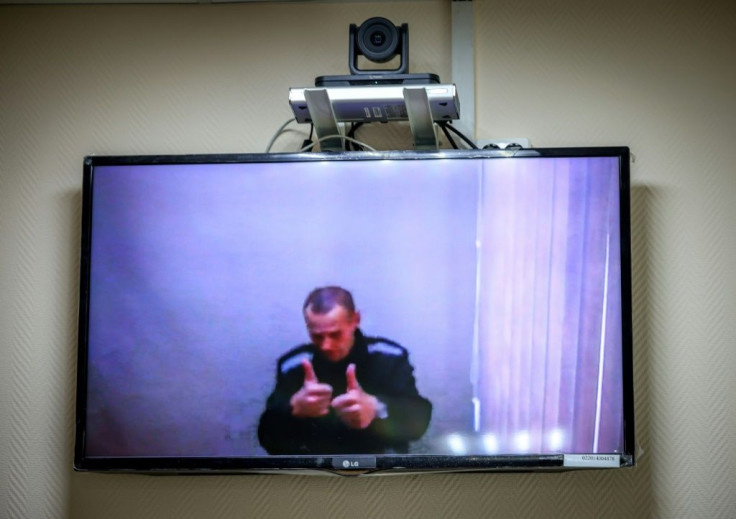UK, US Sanction More Russians For Navalny Poisoning
Britain and the United States sanctioned several Russian officials and entities on the first anniversary Friday of the near-fatal poisoning of jailed Kremlin critic Alexei Navalny, which the West blames on Moscow.
Separately, Washington blacklisted two unnamed Russians and a vessel for their involvement in the Nord Stream 2 pipeline.
The individuals covered by the joint sanctions are all members of Russia's domestic security service the FSB, successor to the KGB, and accused of planning or carrying out the August 20, 2020 nerve agent attack on Navalny.
They now face asset freezes and travel bans under the second round of reprisals in which Britain targeted seven individuals for involvement in the poisoning, after blacklisting six individuals and one entity in October 2020.
In Moscow, the foreign ministry condemned what it called "unilateral, illegitmate" sanctions.
"Russia has called several times on Britain and its partners to back up the accusation with evidence," said ministry spokeswoman Maria Zakharova on the Telegram social network.
"But Britain and its partners continue to ignore these calls."

The United States and European Union also imposed a round of their own sanctions in March.
Western intelligence agencies have assessed with "high confidence" that FSB officers poisoned Navalny with the nerve agent Novichok last year.
The dissident was flown to Germany for treatment but defiantly returned home in January, only to be arrested and sent to a penal colony.
British Foreign Secretary Dominic Raab said the latest sanctions were "sending a clear message that any use of chemical weapons by the Russian state violates international law".
He reiterated Western calls for a "transparent criminal investigation" into the poisoning.

"We urge Russia to declare its full stock of Novichok nerve agents," Raab added, saying there should be no impunity for the use of chemical weapons.
US Office of Foreign Assets Control Director Andrea Gacki said in a statement, "Navalny's poisoning was a shocking violation of international norms against the use of chemical weapons and was part of an ongoing campaign to silence voices of dissent in Russia."
Those newly-targeted by Britain and the United States include alleged FSB operatives Alexey Alexandrov, Vladimir Panyaev and Ivan Vladimirovich Osipov.
The trans-Atlantic allies claim the trio where all present in the Russian city Tomsk at the time of Navalny's poisoning there and were "key figures" in the attempted assassination.
Four other high-ranking officials -- including a major-general, a general and a colonel in the FSB -- were hit with the sanctions.
And Washington sanctioned Artur Zhirov and Konstantin Kudryavtsev, who were not on the UK blacklist.
The United States also targeted Russia's State Institute for Experimental Military Medicine and the FSB Criminalistics Institute, which it said many of the suspects in the poisoning were involved with to varying degrees.
Washington gave few details on those sanctioned over the pipeline carrying gas from Russia to Germany. In a statement, Secretary of State Antony Blinken said the moves represent the United States' "continuing opposition to the Nord Stream 2".
Last month, the United States agreed to support a deal with Germany to warn Russia of potential sanctions and support Ukraine's energy sector financially to settle the dispute over the conduit.
The new sanctions further erode ties between Moscow and the West following Russia's annexation of Crimea in 2014, which led to a host of sanctions being imposed.
London's relations with Moscow have been dire since the 2006 radiation poisoning death in the British capital of former spy Alexander Litvinenko.
He blamed Putin for his death in a posthumous message.
Relations worsened after the 2018 attempted murder of former double agent Sergei Skripal and his daughter in the English city of Salisbury, using Novichok.
That prompted tit-for-tat expulsions of diplomats in both capitals.
Russia hit out at Western capitals following the last round of punitive measures announced in March, warning its foes "not to play with fire".
© Copyright AFP 2024. All rights reserved.





















